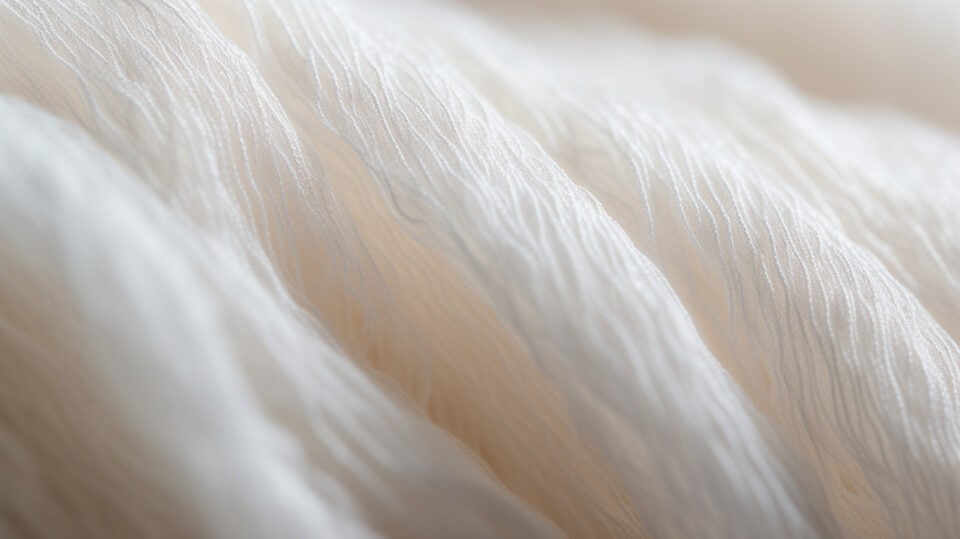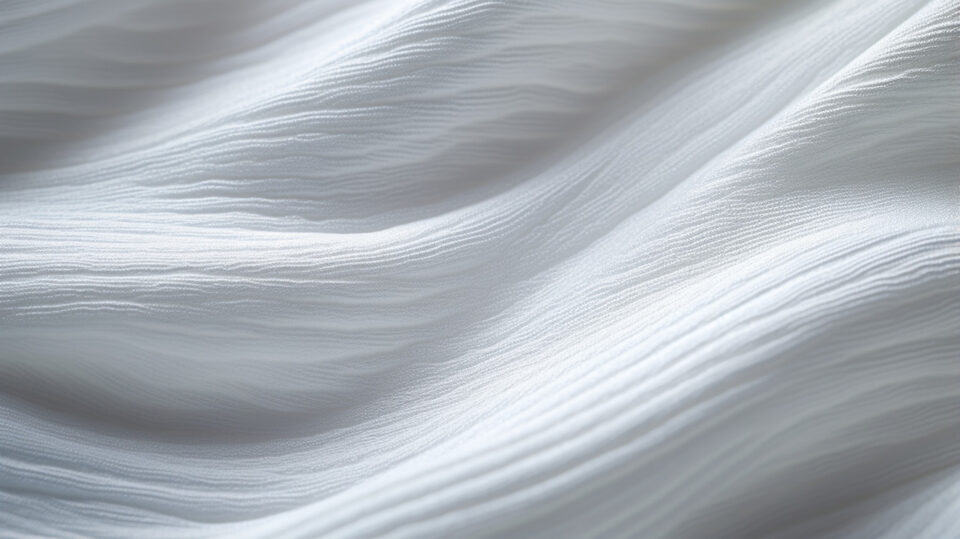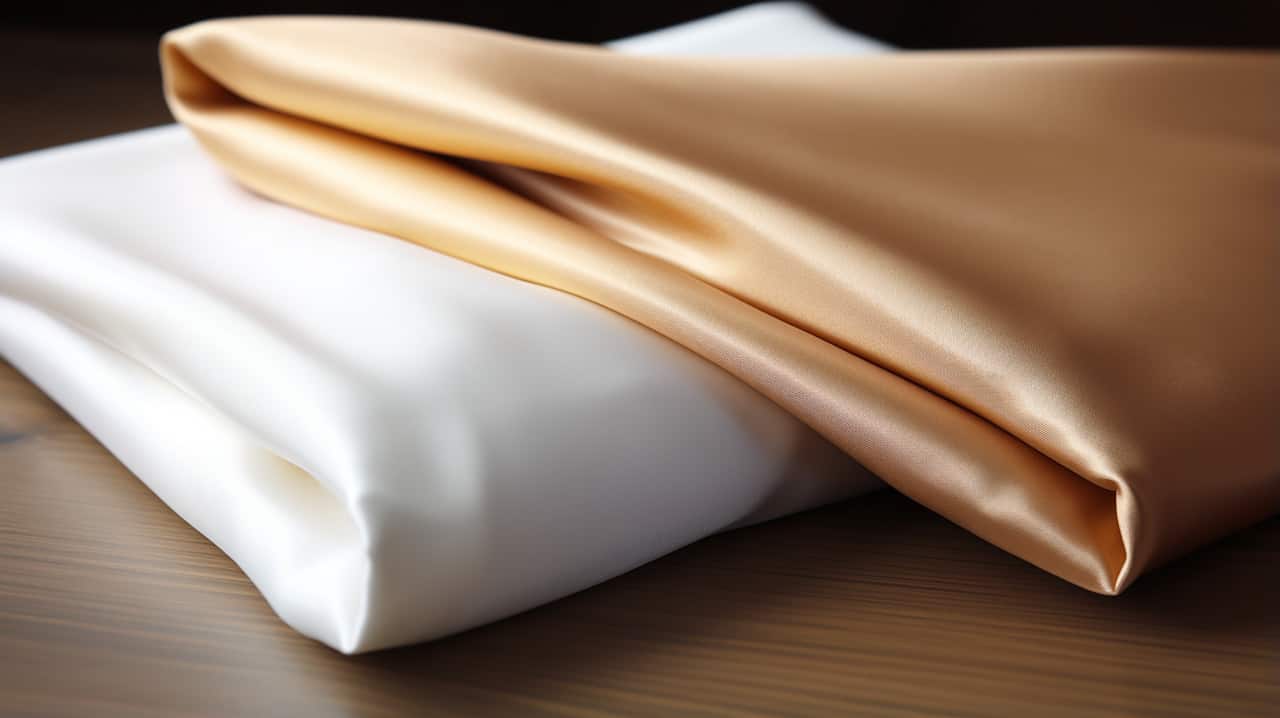Have you ever been stumped while deciding between cotton and nylon fabrics? Trust me, I’ve been in your shoes. After considerable research on both types of materials, I discovered that each fabric has its unique qualities.
This blog post will unravel the mystery behind these two popular textiles, helping you choose between nylon’s durability and cotton’s comfort effortlessly. Ready to become a textile expert?
Key Takeaways
Nylon is a synthetic fabric made in factories using chemicals and is known for its strength and durability. It resists stains and wrinkles, but it’s not as breathable or comfortable as cotton.
Cotton is a natural fiber that comes from the cotton plant. It’s soft, comfortable, and breathable, with good moisture absorption. However, it wrinkles easily and may shrink when washed.
Nylon is better for outdoor gear and activewear due to its durability and quick-drying properties. Cotton is ideal for clothing and bedding because of its softness, breathability, and absorbency.
Consider your needs – if you prioritize durability, choose nylon; if comfort and breathability are important to you, opt for cotton.
Table of Contents
Understanding Nylon

Nylon is a synthetic fabric that was first created in the 1930s and has since become widely used in various applications due to its unique properties.
What is Nylon?
Nylon is a type of fabric that people make in factories, meaning it does not come from plants or animals. People first made it during World War II, when there was a need for strong and light material.
Nylon has some great features, like being hard to stain and not getting wrinkles after washing. But keep in mind harsh chemicals are used to make it, unlike naturally made fabrics such as cotton and linen.
Properties of Nylon
Nylon is a very strong fabric. It can handle more wear and tear than cotton. You will notice that it lasts longer too. Nylon does not pick up dirt or stains like other fabrics do, which helps keep it looking new for longer.
Despite being strong, nylon is light to hold and dries fast when wet. Plus, this man-made fabric made from harsh chemicals costs less than natural ones like cotton!
Pros and Cons of Nylon
This fabric has some great perks. One big plus is that it’s made to be very strong, winning in a test of tear resistance. It can take quite a hit and still hold on. Even more, nylon is good at fighting off stains. If you spill something, don’t worry! It likely won’t leave a mark on this fabric.
Understanding Cotton

Cotton is a natural fiber that comes from the cotton plant and has been used for centuries in textile production.
What is Cotton?
Cotton is a natural fiber that comes from the cotton plant. It has been used for thousands of years to make things like dresses, t-shirts, towels, and underwear. Cotton is known for being soft and comfortable to wear.
It can absorb a lot of moisture, which makes it great for keeping you dry. However, cotton does have some drawbacks – it wrinkles easily and can shrink when washed. Overall, cotton is a popular choice because it’s breathable and feels nice against the skin.
Properties of Cotton
Cotton is a natural fiber that comes from the cotton plant. It is known for its softness and comfort, making it a popular choice for clothing like dresses, t-shirts, and underwear.
Cotton has high absorbency, meaning it can soak up moisture really well – in fact, it can absorb about 25 times its weight in water! This makes cotton great for towels and robes because it can dry you off quickly.
One downside is that cotton wrinkles easily when washed, so you might need to iron your clothes if you want them to look neat. Also, keep in mind that cotton isn’t resistant to stains.
Pros and Cons of Cotton
Cotton has some great qualities, but it also has a few drawbacks. Here are the pros and cons of cotton:
Pros:
- Cotton is a natural fiber since it comes from the cotton plant.
- It is soft and comfortable to wear.
- Cotton has good breathability, making it great for hot weather.
- It is absorbent and can soak up sweat easily.
- Cotton is durable and can withstand regular wear and tear.
- It is easy to dye, so you can find cotton in a wide range of colors.
Cons:
- Cotton wrinkles easily, so you may need to iron or steam it.
- It is not resistant to stains, so you need to be careful with spills.
- Cotton shrinks when washed in hot water, so be sure to follow the care instructions on your clothes.
Key Differences Between Nylon and Cotton

Nylon and cotton have significant differences in terms of comfort, moisture absorption, breathability, durability, wrinkle resistance, quick-drying ability, weight, maintenance requirements, environmental impact, allergies, and UV resistance.
To understand these differences and choose the right fabric for your needs, read on…
Source
Nylon and cotton come from different sources. Nylon is made in a lab using chemicals, while cotton comes from the cotton plant. That means nylon is man-made, while cotton is natural.
So if you prefer fabrics that are more eco-friendly and renewable, then cotton might be your best choice! Plus, cotton has been used for thousands of years and is a tried-and-true favorite among fabric lovers.
Comfort
When it comes to comfort, cotton is known for its softness and coziness. Cotton fabric feels gentle on the skin, making it a popular choice for clothing like t-shirts, dresses, underwear, and robes.
It is breathable and allows air to circulate easily, which helps keep you cool in hot weather. Cotton is also hypoallergenic and gentle on sensitive skin. On the other hand, nylon may not be as comfortable as cotton due to its synthetic nature.
While nylon can be lightweight and smooth to the touch, it doesn’t provide the same level of breathability or softness that cotton does. However, nylon has other advantages, such as durability and resistance to wrinkles and abrasion, compared to cotton.
Moisture Absorption
Nylon doesn’t absorb moisture very well, so it won’t make you feel sweaty or damp. On the other hand, cotton is great at absorbing moisture – it can soak up about 25 times its own weight in water! This means that cotton is a good choice if you’re going to be doing activities that make you sweat a lot because it will help keep you dry.
Nylon, on the other hand, might be better for situations where you want to stay cool and comfortable.
Breathability
Cotton is a fabric that is highly breathable, which means that it allows air to flow through and keeps you feeling cool and comfortable. This is because cotton fibers are natural, and they have tiny spaces between them that allow air to circulate.
On the other hand, nylon is not as breathable as cotton. Nylon fibers are synthetic and packed closely together, which makes it more difficult for air to pass through. So if you’re looking for a fabric that will keep you cool in hot weather or during physical activities, cotton would be the better choice.
Durability
When it comes to durability, nylon fabric has the upper hand over cotton. Nylon is known for its strength and long lifespan, making it more resistant to wear and tear compared to cotton.
This means that garments or items made from nylon will last longer and withstand daily use without easily showing signs of damage or degradation. On the other hand, cotton is less durable and tends to be more prone to wear and tear over time.
So if you’re looking for a fabric that can stand up to regular use and maintain its quality, nylon would be a better choice than cotton.
Wrinkle Resistance
Nylon is known for its wrinkle resistance, meaning it doesn’t easily get wrinkled. This is one of the advantages of using nylon fabric. On the other hand, cotton is not as resistant to wrinkles as nylon.
When you wash nylon, it won’t wrinkle like cotton does when washed. So if you want a fabric that stays smooth and wrinkle-free even after washing, then nylon would be a good choice for you.
Cotton, on the other hand, may require some ironing or extra care to keep it looking neat and unwrinkled.
Quick-drying
Nylon is known for its quick-drying properties. Unlike cotton, which takes longer to dry, nylon has a very low absorbency rate. This means that it doesn’t hold onto moisture as much, allowing it to dry faster.
So if you’re looking for a fabric that dries quickly after being washed or exposed to water, nylon is the way to go!
Weight
Nylon and cotton have different weights. Nylon is lightweight and has a lower weight compared to cotton. If you need fabric for activities that require something lighter, nylon would be a good choice due to that advantage in addition to its quick-drying properties.
Cotton, however, may be the better choice if you prefer something with more weight to it.
Maintenance
In terms of maintenance, nylon fabric is generally easier to care for compared to cotton. Nylon can be machine-washed and dried, making it convenient and time-saving. It is also more resistant to wrinkles, so you don’t have to worry about ironing or steaming as much.
Additionally, nylon is less likely to shrink or fade in color with multiple washes, while cotton requires more delicate handling. It may need special attention when washing and might require ironing to remove wrinkles.
Cotton can also shrink if not properly cared for or exposed to high heat during drying. So if you prefer a low-maintenance fabric that doesn’t require much fuss, nylon might be the better choice for you.
Environmental Impact
The choice between nylon and cotton fabric also has an impact on the environment. Nylon production contributes to carbon emissions and pollution, while cotton production leads to water pollution and soil degradation.
Synthetic fibers like nylon can contribute to microplastic pollution in our oceans and waterways, posing a threat to marine life. On the other hand, cotton is a more sustainable option compared to nylon because it comes from renewable sources and has a lower carbon footprint.
It’s important to consider these environmental factors when choosing between nylon and cotton fabrics for your clothing or other items.
Allergies
Regarding allergies, it’s important to note that nylon may cause skin irritation and rashes. This can be problematic for some people, especially those with sensitive skin. On the other hand, cotton is hypoallergenic and rarely causes allergic reactions.
So if you have any concerns about potential allergies or skin sensitivities, cotton would be a safer choice in terms of fabric.
UV Resistance
Nylon is great at protecting you from the sun’s harmful UV radiation. It has a higher UV protection factor than cotton, which means it can block more of those damaging rays. While cotton may provide some UV protection, it’s not as reliable as nylon.
That’s why nylon is often used for outdoor clothing and gear to keep you safe from the sun. So if you’re planning on spending a lot of time outside, nylon might be the better choice to protect your skin from harmful UV rays.
Cost
Nylon is generally more expensive than cotton. The cost of nylon can vary depending on the specific type and quality of the fabric. Cotton, on the other hand, is a more affordable option compared to nylon.
The production of nylon involves higher manufacturing costs compared to cotton. It’s important to note that the production of cotton also has a slightly less dramatic climate impact.
Flame Resistance
When it comes to flame resistance, nylon is known for its ability to withstand high temperatures. It has a higher melting point than cotton, which makes it more resistant to heat. On the other hand, cotton is not exactly flame-resistant.
However, both nylon and cotton fabrics can be treated with flame-retardant chemicals to enhance their fire resistance if that is a personal need. It’s important to note that these treatments may wash out over time, so reapplication might be necessary.
If you’re looking for a fabric that offers better protection against flames, nylon may be your best bet.
Dyeability
When it comes to dyeability, there is a clear difference between nylon and cotton. Nylon has a higher dyeability compared to cotton. This means that nylon can be easily dyed with vibrant colors.
On the other hand, cotton has a lower dyeability than nylon. To achieve the desired colors on cotton, more dye may be required, and longer processing time may be needed. Additionally, nylon retains dye better and does not fade as quickly as cotton.
So if you want a fabric that can hold its color well, nylon might be the better choice for you.
Static Electricity
Static electricity is something that you may have experienced before, especially when wearing certain types of clothing. One fabric that is known for generating static electricity is nylon.
Because it is a synthetic material, nylon has a tendency to create static charges. When you wear nylon clothing, these charges can build up and cause discomfort or irritation. Contrarily, cotton does not have a significant association with static electricity and is less likely to generate those annoying shocks due to cotton being a natural fiber with higher absorbency.
Absorbency
When it comes to absorbency, cotton is the clear winner. Cotton has a higher absorbency rate compared to nylon, able to soak up about 25 times its own weight in moisture. This means that cotton can effectively wick away sweat and keep you dry during intense workouts or hot summer days.
On the other hand, nylon has very low absorbency and tends to hold onto moisture, which can make you feel sweaty and uncomfortable. So if you’re looking for a fabric that will keep you dry and comfortable, especially during physical activities, cotton is the better choice.
Thermal Properties
Nylon and cotton have different thermal properties. Nylon has higher thermal insulation compared to cotton, which means it can help keep you warm in cooler temperatures. It also has a higher melting point than cotton, making it more resistant to heat damage.
On the other hand, cotton is known for its breathability and ability to absorb moisture. This makes it a better choice for hot and humid climates as it helps keep you cool by allowing air to circulate and sweat to evaporate.
So, if you’re looking for a fabric that provides warmth in colder weather, nylon might be the better option. But if you want something breathable and comfortable for hot weather, cotton would be a good choice instead.
Environmental Sustainability
When it comes to environmental sustainability, cotton is the clear winner. Cotton is a natural fiber that comes from the cotton plant and is biodegradable. This means that it can break down naturally over time and does not contribute to pollution in the same way that synthetic materials like nylon do.
Nylon, on the other hand, is a purely synthetic material made from harsh chemicals and takes hundreds of years to decompose. By choosing cotton over nylon, you are making a more eco-friendly choice that supports renewable resources and reduces waste in our environment.
Applications of Nylon and Cotton

Nylon and cotton have different applications due to their unique properties. Nylon is commonly used in swimwear and athletic apparel because it is lightweight, quick-drying, and resistant to tears and abrasions.
It is also used in items like rope, webbing, socks, and thread. On the other hand, cotton is widely used for clothing such as dresses, t-shirts, towels, underwear, and robes. Its breathable nature makes it perfect for hot weather.
Additionally, cotton is often used by painters as canvases due to its absorbent qualities. Both fabrics have their own strengths and are suitable for various purposes based on their specific attributes.
Common Misconceptions about Nylon and Cotton

There are some common misconceptions about nylon and cotton that I want to clear up. Here are the facts:
- Nylon is not always the best choice for all athletic activities; cotton can also be a good option.
- Cotton can be suitable for formal events if chosen in the right style and design.
- Nylon doesn’t always fade faster than cotton; it depends on various factors, like exposure to sunlight and the quality of dyes used.
- Cotton is not always cheaper than nylon; the cost depends on the specific fabric type and brand.
- While nylon was originally used for parachutes during World War II, it is now used in various products beyond just tires and netting.
- Not all nylon fabrics are waterproof; there are different types with varying degrees of water resistance.
Choosing the Right Fabric: Nylon vs Cotton

When it comes to choosing the right fabric, there are a few factors to consider. Nylon is a synthetic material made with harsh chemicals, while cotton is a natural fiber sourced from the cotton plant.
If you want something that is more absorbent and biodegradable, cotton would be a better option. However, if you prefer something stain-resistant and durable, nylon might be the way to go.
It ultimately depends on your personal taste and practicality needs. Remember that nylon takes many decades to break down, while cotton is eco-friendly and renewable. So think about whether you’ll be using the fabric indoors or outdoors, as well as any specific cost considerations, before making your decision between nylon or cotton.
People Also Ask
What are the main differences between nylon and cotton fabrics?
Nylon is a synthetic fabric made from petroleum, while cotton is a natural fabric derived from the cotton plant. Nylon tends to be more durable and water-resistant, whereas cotton is softer and breathable.
Which fabric is better for hot weather: nylon or cotton?
What are the main differences between nylon and cotton fabrics?
Nylon is a synthetic fabric made from petroleum, while cotton is a natural fabric derived from the cotton plant. Nylon tends to be more durable and water-resistant, whereas cotton is softer and breathable.
How do I choose between nylon or cotton when buying clothing or bedding?
Consider your needs: If you require durability or water resistance, choose nylon; if comfort and breathability are important, go for cotton. Additionally, check the care instructions on your clothing, since some blends of fabrics exist where their properties combine.
Can I wash both nylon and cotton fabrics in the same way?
No, you should wash nylon and cotton fabrics differently. Nylon can be machine-washed on a gentle cycle and tumble-dried on low heat, while cotton can withstand regular machine washing with warm water.
